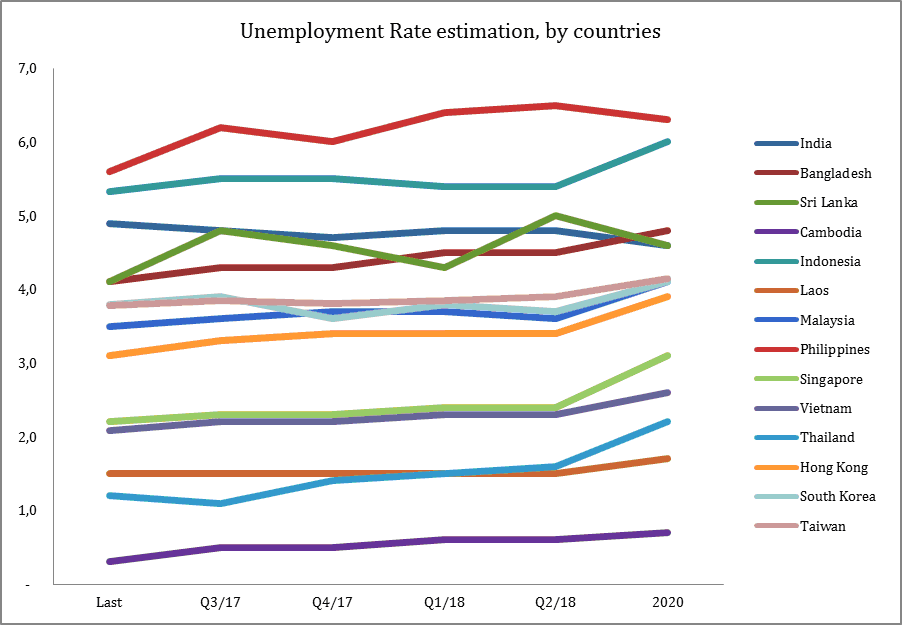Next billion users: who these people are and how they will affect the global economy
This is how these users will look like:

Thanks to the initiative of Google and a number of other companies, everything goes to the fact that the Internet will grow by about 1 billion people right now. Now the network is used by 2.8 billion people out of 7 available, and there will be 3.8.
')
And these new guys here will break everything, I think. Now I will try to explain why.
The first major question is who they are. These are those who, thanks to cheaper technologies and increased coverage, will be able to step over the financial threshold for connecting to the network. These people live mainly in Asia - in Malaysia, in the Philippines, in Indonesia, and some in the same mainland China.

Next, let's try to understand who they are. In my opinion, these are people who rarely see computers today. Their first contact with the network will be through a mobile phone, for example, purchased at a cheap price from the operator’s stock. Most likely, the first thing that awaits them is popular instant messengers, where they will establish relationships with their groups and working groups. Social networks will be too complicated for yesterday’s poor, but messengers are just right. There are very simple interfaces, there is a very flat learning curve, and there is nothing too complicated there. But there is a dancing turd that is very, very much in demand by those who print poorly, write poorly or do not know all the necessary languages. And there are voice messages that are already actively used by those who do not want to write, or by those who have too poor communication for a full-fledged IP call.
When these people realize that they can communicate with each other through the network, the technological barriers will be removed - as in Russia, retired people who print with one finger understand why they need Skype in an instant, and so it will be there, most likely.
Just imagine: at least nine hundred million not very literate people who can farm or do simple work. And another hundreds of millions of qualified professionals, to which the Internet has fully reached.
An example is India’s current labor market, where 287 million people cannot read and write (this is 37% of the total number of illiterate people in the world). And almost all of them are mobile Internet users.
Facilitates the network. In 2020, according to dev.Google, 10% of users in the world will be on 2G. Put priority on content and simple navigation. Reduce energy consumption, because people will really work with phones. Develop cross-device solutions. They make new payment systems, because at least 8% of new people will not have a bank account and credit cards. Create resources for quick localization of everything - only 5.5% will know English at least somehow.
They will start looking for work. One of the main problems of Malaysia, Indonesia and other Asian countries in the region is unemployment. As it once was in India, so it will be in that region - people will start selling their services to where they pay for them. That is, in more developed countries. And, as it seems to me, it is unlikely that these will be classic freelancing services like IT support or layout. Rather, something in the spirit of traditional offline markets such as repair and construction, translation and localization, training, medicine, all sorts of mystery shoppers, and so on. What needs to be done locally.

The whole landscape of services will change - modern applications and platforms are strong with their accumulated base, and the influx of new people with a thirst for simple interfaces can turn everything around. We will learn about a lot of new things that will be taken from nowhere in a matter of months (as Uber or AirB & B has become a shock for many people at one time).
The network will become easy again - a minimum of content so that these people can use it from the phone on bad tariff plans. Megabyte will again be a whole sea of information, and not a third profile picture. According to Opera, the previous audience (people who only reached the Internet), installs 18 new applications on the phone, and 6 of them use almost constantly. This is a replacement site. The main segments are communication, payment, health, training.
They will get access to objective information (at least they will be able to get it) and will be able to learn faster. Today, numerically the most qualified engineers live in China. After a generation, there will be several more countries with the same training of specialists.
The most valuable in the new economy (there is even the term Gig Economy - the economy in the wake of traditional work) will be brains. And these guys purely by virtue of the statistics of the brain will be more than in Europe.
In general, there is a sea of opportunities and a sea of new markets. From the side this tantrum is a bit like a story with dot-comies of two thousandths, but there is a rational grain. We are now developing products for this story, and a little later I will be able to talk about the more practical side of the issue.

Thanks to the initiative of Google and a number of other companies, everything goes to the fact that the Internet will grow by about 1 billion people right now. Now the network is used by 2.8 billion people out of 7 available, and there will be 3.8.
')
And these new guys here will break everything, I think. Now I will try to explain why.
Where are these people from?
The first major question is who they are. These are those who, thanks to cheaper technologies and increased coverage, will be able to step over the financial threshold for connecting to the network. These people live mainly in Asia - in Malaysia, in the Philippines, in Indonesia, and some in the same mainland China.

Next, let's try to understand who they are. In my opinion, these are people who rarely see computers today. Their first contact with the network will be through a mobile phone, for example, purchased at a cheap price from the operator’s stock. Most likely, the first thing that awaits them is popular instant messengers, where they will establish relationships with their groups and working groups. Social networks will be too complicated for yesterday’s poor, but messengers are just right. There are very simple interfaces, there is a very flat learning curve, and there is nothing too complicated there. But there is a dancing turd that is very, very much in demand by those who print poorly, write poorly or do not know all the necessary languages. And there are voice messages that are already actively used by those who do not want to write, or by those who have too poor communication for a full-fledged IP call.
When these people realize that they can communicate with each other through the network, the technological barriers will be removed - as in Russia, retired people who print with one finger understand why they need Skype in an instant, and so it will be there, most likely.
Just imagine: at least nine hundred million not very literate people who can farm or do simple work. And another hundreds of millions of qualified professionals, to which the Internet has fully reached.
An example is India’s current labor market, where 287 million people cannot read and write (this is 37% of the total number of illiterate people in the world). And almost all of them are mobile Internet users.
What is Google doing?
Facilitates the network. In 2020, according to dev.Google, 10% of users in the world will be on 2G. Put priority on content and simple navigation. Reduce energy consumption, because people will really work with phones. Develop cross-device solutions. They make new payment systems, because at least 8% of new people will not have a bank account and credit cards. Create resources for quick localization of everything - only 5.5% will know English at least somehow.
What happens next?
They will start looking for work. One of the main problems of Malaysia, Indonesia and other Asian countries in the region is unemployment. As it once was in India, so it will be in that region - people will start selling their services to where they pay for them. That is, in more developed countries. And, as it seems to me, it is unlikely that these will be classic freelancing services like IT support or layout. Rather, something in the spirit of traditional offline markets such as repair and construction, translation and localization, training, medicine, all sorts of mystery shoppers, and so on. What needs to be done locally.

The whole landscape of services will change - modern applications and platforms are strong with their accumulated base, and the influx of new people with a thirst for simple interfaces can turn everything around. We will learn about a lot of new things that will be taken from nowhere in a matter of months (as Uber or AirB & B has become a shock for many people at one time).
The network will become easy again - a minimum of content so that these people can use it from the phone on bad tariff plans. Megabyte will again be a whole sea of information, and not a third profile picture. According to Opera, the previous audience (people who only reached the Internet), installs 18 new applications on the phone, and 6 of them use almost constantly. This is a replacement site. The main segments are communication, payment, health, training.
They will get access to objective information (at least they will be able to get it) and will be able to learn faster. Today, numerically the most qualified engineers live in China. After a generation, there will be several more countries with the same training of specialists.
The most valuable in the new economy (there is even the term Gig Economy - the economy in the wake of traditional work) will be brains. And these guys purely by virtue of the statistics of the brain will be more than in Europe.
In general, there is a sea of opportunities and a sea of new markets. From the side this tantrum is a bit like a story with dot-comies of two thousandths, but there is a rational grain. We are now developing products for this story, and a little later I will be able to talk about the more practical side of the issue.
Source: https://habr.com/ru/post/339194/
All Articles